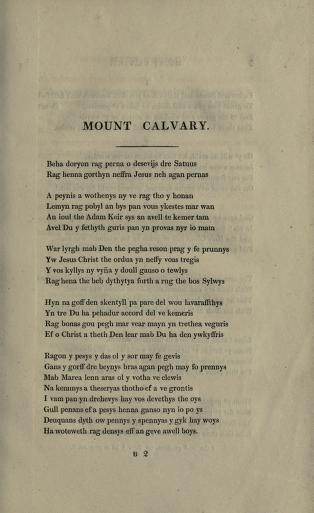Cornish is a Southwestern Brittonic language of the Celtic language family. Along with Welsh and Breton, Cornish is descended from the Common Brittonic language spoken throughout much of Great Britain before the English language came to dominate. For centuries, until it was pushed westwards by English, it was the main language of Cornwall, maintaining close links with its sister language Breton, with which it was mutually intelligible, perhaps even as long as Cornish continued to be spoken as a vernacular. Cornish continued to function as a common community language in parts of Cornwall until the mid 18th century, and there is some evidence for traditional speakers of the language persisting into the 19th century.
Middle English Bible translations (1066–1500) covers the age of Middle English, beginning with the Norman Conquest and ending about 1500.
Nicholas Jonathan Anselm Williams, sometimes credited as N. J. A. Williams, is a leading expert and poet in the Cornish language.

Henry Jenner was a British scholar of the Celtic languages, a Cornish cultural activist, and the chief originator of the Cornish language revival.

Parts of the Bible have been translated into Welsh since at least the 15th century, but the most widely used translation of the Bible into Welsh for several centuries was the 1588 translation by William Morgan, Y Beibl cyssegr-lan sef Yr Hen Destament, a'r Newydd as revised in 1620. The Beibl Cymraeg Newydd was published in 1988 and revised in 2004. Beibl.net is a translation in colloquial Welsh which was completed in 2013.

Cornish literature refers to written works in the Cornish language. The earliest surviving texts are in verse and date from the 14th century. There are virtually none from the 18th and 19th centuries but writing in revived forms of Cornish began in the early 20th century.
Kernewek Kemmyn is a variety of the revived Cornish language.
William Scawen (1600–1689) was one of the pioneers in the revival of the Cornish language. He was a politician who sat in the House of Commons in 1640 and fought for the Royalist cause in the English Civil War.
John Boson (1655–1730) was a writer in the Cornish language. The son of Nicholas Boson, he was born in Paul, Cornwall. He taught Cornish to William Gwavas. His works in Cornish include an epitaph for the language scholar John Keigwin, and the "Pilchard Curing Rhyme". He also wrote an epitaph for James Jenkins who died in 1710 and also wrote Cornish verse; and translated parts of the Bible, the Lord's Prayer and the Apostles' Creed. The only known surviving lapidary inscription in the Cornish language, is also his work, and can be found in Paul Church where John Boson, his father, and their relative Thomas Boson are also buried.
Kernowek Standard, its initial version spelt Kernowak Standard, is a variety of the spelling of revived Cornish. It has two specifications, the first of which was published as a draft proposal in March 2007, and the second of which was published as a practical orthography in May 2012.
Alan M. Kent was a Cornish poet, dramatist, novelist, editor, academic and teacher. He was the author of a number of works on Cornish and Anglo-Cornish literature.
Biblical translations into the indigenous languages of North and South America have been produced since the 16th century.

John Keigwin (1641–1716) was a Cornish antiquary, born at Mousehole, Cornwall. He was a leading member of a group of antiquaries in west Penwith: this group also included John and Thomas Boson, William Gwavas, Thomas Tonkin, William Borlase, Oliver Pender, and James Jenkins of Alverton. His teacher was John Boson. In addition to Cornish and English, Keigwin had a command of the French, Latin, Greek and Hebrew languages.
The Bible, or portions of it, have been translated into over 1,000 languages of Africa.
Traditionally Russia used the Old Church Slavonic language and Slavonic Bible, and in the modern era Bible translations into Russian. The minority languages of Russia usually have a much more recent history, many of them having been commissioned or updated by the Institute for Bible Translation.
The Cornish language revival is an ongoing process to revive the use of the Cornish language of Cornwall, England. The Cornish language's disappearance began to hasten during the 13th century, but its decline began with the spread of Old English in the 5th and 6th centuries. The last reported person to have full knowledge of a traditional form of Cornish, John Davey, died in 1891. The revival movement started in the late 19th century as a result of antiquarian and academic interest in the language, which was already extinct, and also as a result of the Celtic revival movement. In 2009, UNESCO changed its classification of Cornish from "extinct" to "critically endangered", seen as a milestone for the revival of the language.

The anonymous poem Pascon agan Arluth is the oldest complete literary work in the Cornish language, dating from the 14th century. The modern title means "The Passion of Our Lord", but the poem has also been published as Mount Calvary.
James Jenkins was a Cornish scholar who left some verses giving moral advice on child raising and marriage in the Cornish language. In his day he was considered a learned scholar of the Cornish language. Little of his work has survived.

Craig Weatherhill was a Cornish antiquarian, novelist and writer on the history, archaeology, place names and mythology of Cornwall.








